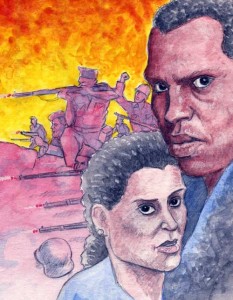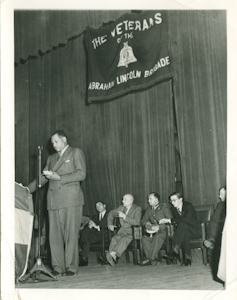Paul Robeson Spain
About ‘Robeson in Spain’

Paul Robeson’s concerns about fascism in the 1930s—military aggression, racial injustice, civilian bombings, and forced population displacement—remain issues of our own times. Seven decades later, ALBA’s magazine, The Volunteer, published a comic titled Robeson in Spain, detailing Robeson’s activism and dedication to the Spanish cause. It is ALBA’s hope that this work of art, history, and research can be embraced and appreciated by students of history and by the public as a way to convey the progressive ideals of Paul Robeson and the volunteers of the Abraham Lincoln Brigade.
By the mid-1930s, Paul Robeson had achieved international acclaim as an actor, singer, and public personality who criticized racism. The rise and expansion of fascism in Germany and Italy and other parts of the world intensified his concerns about the precarious state of democracy, freedom, and social justice. After the Spanish Civil War began in 1936, Robeson threw his support behind the elected government. “The artist must take sides,” he announced. He sang often to raise funds for children displaced by the war and appealed for assistance to the Spanish Republic.
In 1938, he and his wife, Eslanda, went to Spain to learn directly about the fascist threat and to support the soldiers defending democracy. Three years later, after Spain had fallen to the pro-fascist dictator, General Francisco Franco and World War II had begun, the American survivors of the Spanish Civil War made Paul Robeson an honorary member of the Veterans of the Abraham Lincoln Brigade.
The ‘Robeson In Spain’ project also includes two lesson plans, multimedia primary resources, and an extensive bibliography to facilitate the teaching and learning about the Spanish Civil War and the commitment of men and women from other countries to preserve democratic ideals.
Who was Paul Robeson?
“The artist must elect to fight for freedom or for slavery. I have made my choice. I had no alternative.” – Paul Robeson, 1937.

The African-American Paul Robeson, a large man with a deep voice, achieved great distinction as an athlete, singer, actor, scholar, and supporter of social justice. Born in Princeton, New Jersey, Robeson graduated from Rutgers University with honors. He excelled in sports (All-American in football). He graduated from Columbia Law School in 1923 and married Eslanda Cordozo Goode. He won fame as an actor on stage and screen. In the popular musical Showboat, Robeson sang “Ol’ Man River.”
The rise of fascism in Europe in the 1930s awakened Robeson’s political activism. He sang benefit concerts to assist Jewish refugees from Hitler’s Germany and to support Spain’s democracy during the Spanish Civil War. His mounting concern over fascist Germany’s and Italy’s direct support of the Spanish insurgents, and the western democracies’ refusal to assist the legitimate government, led him to visit the war-torn country in January 1938. He called his 1938 trip to Spain “a major turning point in my life.”He became an outspoken critic of U.S. segregation and lynching. In 1939, he recorded “Ballad for Americans,” a work that celebrated diversity and multiculturalism.
Robeson’s demand for equality and his opposition to the Cold War in the 1940s angered conservatives, who called Robeson a Communist. His refusal to be silent led to violent attacks at a concert in Peekskill, New York, in 1949. His criticism of the Korean War led the U.S. government to revoke his passport (later overturned by the Supreme Court), which limited his travels until 1956. He died after a long illness at the age of 77.
To learn more about Paul Robeson, see our bibliography.